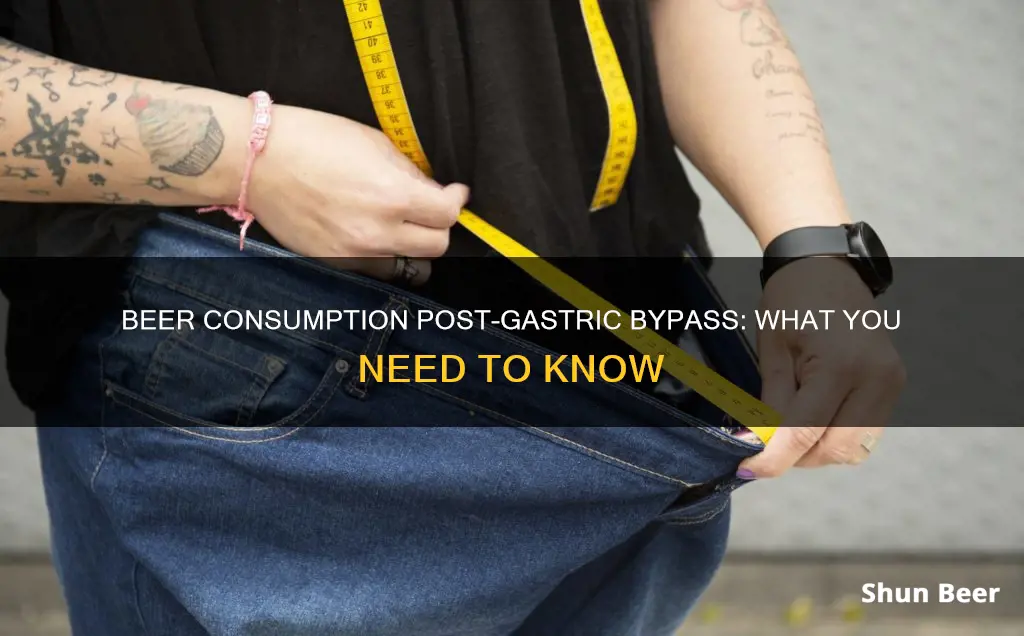
Gastric bypass surgery is a weight-loss procedure that reduces the size of the stomach and blocks some calorie absorption by rerouting the digestive system. After the surgery, patients must adapt their lifestyles and diets to maintain long-term weight loss. This includes changing what and how they eat and drink. Beer and other alcoholic beverages are often cautioned against by surgeons due to concerns about consuming empty calories, distending the stomach pouch, sensitivity to alcohol, weight gain, and the development of alcohol addiction. However, some surgeons allow moderate alcohol consumption after the first six months.
Can you drink beer after gastric bypass?
| Characteristics | Values |
|---|---|
| Alcohol consumption after gastric bypass | Some surgeons advise against drinking alcohol for at least the first six months after gastric bypass surgery, and some recommend abstinence for life. However, some surgeons allow moderate alcohol consumption after the first six months. |
| Alcohol metabolism after gastric bypass | The body metabolises alcohol differently after gastric bypass surgery, leading to higher and quicker peak blood alcohol levels. |
| Alcohol and nutrition | Alcoholic drinks contain empty calories and sugars, taking up space in the stomach that should be filled with nutrient-rich food, vitamins, and minerals. |
| Alcohol and weight loss | Alcohol may slow down weight loss and lead to weight gain. |
| Alcohol and addiction | Gastric bypass patients may be at risk of developing an alcohol use disorder post-surgery, especially if they had a history of addiction. |
| Alcohol and nausea | Alcohol consumption after gastric bypass surgery may cause nausea and vomiting. |
What You'll Learn

Wait at least six months before drinking beer
It is recommended that you wait at at least six months after gastric bypass surgery before drinking beer or any other alcoholic beverage. This is because the surgery significantly impacts how your body metabolises alcohol. During the first six months, your body is also going through rapid weight loss and healing from the surgery, and alcohol can negatively impact both of these processes.
Metabolism
Weight loss surgery, including gastric bypass, reduces the size of your stomach and blocks some calorie absorption by rerouting your digestive system. This means that your body will metabolise alcohol differently after surgery. Specifically, blood alcohol levels will rise more quickly and peak at a higher level than before surgery. It will also take longer for your blood alcohol levels to return to normal.
Weight Loss
Alcoholic drinks typically contain sugars and carbohydrates, which you need to limit after weight loss surgery. Alcohol is also made from sugars, which will slow down your weight loss. Alcohol also takes up space in your stomach, which should be filled with healthy food, vitamins and minerals.
Healing
The first six months after gastric bypass surgery is when your body is healing from the procedure and when weight loss occurs most rapidly. Alcohol can interfere with both of these processes. It can increase the risk of malnutrition, cause nausea and vomiting, and lead to an inflamed and swollen stomach.
Addiction
Weight loss surgery can transfer an addiction from food to another substance, such as alcohol. While the percentage of people who develop an alcohol use disorder after gastric sleeve surgery is small, it is still a risk to be aware of.
Mixing Prozac and Beer: Is It Safe to Drink?
You may want to see also

Avoid sugary and carbonated mixers
After gastric bypass surgery, it is important to be mindful of what you consume, as it can have a significant impact on your recovery and overall health. One of the key considerations is avoiding sugary and carbonated mixers when drinking alcohol. Here are several reasons why this is crucial:
Firstly, carbonated beverages can cause discomfort and stomach expansion. The gas produced by carbonation can lead to bloating and put unnecessary pressure on the incision site. Additionally, carbonated drinks often contain hidden sugars or carbohydrates, which can negatively affect your weight loss goals and overall health. Even carbonated water or diet soda, while not containing sugar, can still contribute to stomach expansion.
Secondly, sugary mixers can cause a rapid increase in blood sugar levels, leading to a higher risk of "dumping syndrome." Dumping syndrome is a highly unpleasant condition characterised by symptoms such as cold sweats, a pounding pulse, cramps, and diarrhoea. It occurs when sugary substances produce a high osmotic load, causing your body to dilute them with water, which in turn reduces blood volume and triggers a shock-like state.
Thirdly, both carbonated and sugary mixers can interfere with your weight loss goals. Carbonated mixers can make you feel full, taking up valuable space in your stomach that should be reserved for nutritious food. Sugary mixers, on the other hand, provide little to no nutritional value and are often high in calories. This can hinder your weight loss progress and even lead to an increased risk of addiction, as you may be more prone to fall into new addictions like alcohol after giving up the addiction to eating.
Finally, it is important to remember that alcohol itself can have negative effects on your health and recovery. Even small amounts of alcohol can lead to low blood sugar and intoxication more quickly due to the impact of weight loss surgery on your metabolism. Therefore, it is crucial to reintroduce alcohol gradually and responsibly, always drinking in moderation and never driving after consuming alcohol.
In conclusion, avoiding sugary and carbonated mixers after gastric bypass surgery is essential for maintaining your health, aiding your recovery, and supporting your weight loss journey. It is important to prioritise nutritious foods and drinks, and always consult with your doctor or dietician for personalised advice.
Understanding Beer Bikes: How Do They Work?
You may want to see also

Alcohol impacts blood sugar levels
Alcohol can impact blood sugar levels in several ways. Firstly, alcoholic drinks can contain high levels of sugar, which can contribute to weight gain and tooth decay if consumed in excess. Sugar in alcoholic drinks can also cause a rise in blood sugar levels, which is particularly dangerous for people with diabetes. Alcohol also contains "empty calories", which can interfere with weight loss goals.
Secondly, alcohol can alter blood sugar levels, increasing the risk of developing alcohol-related diabetes. This is because alcohol can cause a reduction in blood sugar, leading to hypoglycaemia or low blood sugar. This is especially true for people with type 1 diabetes, where blood sugar levels can drop to dangerous levels. Symptoms of hypoglycaemia can include slurred speech, loss of coordination, confusion, and poor vision. These symptoms can be difficult to distinguish from those of drunkenness, and the disinhibiting effect of alcohol can further impair judgement.
Thirdly, alcohol can affect blood sugar levels by stimulating appetite and leading to overeating. This can be problematic for people with diabetes who need to carefully manage their food intake to control their blood sugar. Alcohol can also interfere with the effectiveness of oral diabetes medications or insulin, further impacting blood sugar control.
For individuals who have undergone bariatric surgery, alcohol consumption can lead to low blood sugar or hypoglycaemia. This is because bariatric surgery reduces glycogen levels in the body, and alcohol consumption further depletes these stores. Additionally, alcohol absorption is increased after bariatric surgery, leading to faster intoxication and potentially poor food choices.
To minimise the impact of alcohol on blood sugar levels, it is recommended to drink in moderation, ideally with food, and to avoid sugary mixed drinks, sweet wines, or cordials. It is also important for individuals with diabetes to monitor their blood sugar levels and follow their doctor's advice regarding alcohol consumption.
Drinking Beer While Pregnant: How Much Is Too Much?
You may want to see also

Gastric bypass changes how alcohol is metabolised
Gastric bypass surgery helps morbidly obese individuals lose significant amounts of weight and keep it off. However, patients must follow their surgeon's instructions to maintain long-term weight loss. While some surgeons caution their patients to avoid drinking beer and other alcoholic beverages after gastric bypass, others allow moderate alcohol consumption.
Gastric bypass surgery changes how alcohol is metabolised in the body. The stomach enzyme responsible for breaking down alcohol, alcohol dehydrogenase, is significantly reduced as a portion of the stomach is removed. This allows more alcohol to filter into the bloodstream. As a result, patients who have undergone gastric bypass surgery reach peak blood alcohol levels quicker, have higher than average blood alcohol levels, and hold alcohol in their systems for longer.
A study published in the "Journal of the American College of Surgeons" in February 2011 compared preoperative and postoperative alcohol sensitivity in 19 gastric bypass patients. After drinking 5 oz of red wine, the peak breath alcohol content (BAC) was 0.024% before surgery, 0.059% three months after surgery, and 0.088% six months after surgery. The time needed to return to sobriety also increased from 49 minutes before surgery to 61 minutes three months after surgery. These findings highlight that gastric bypass surgery significantly impacts how alcohol is metabolised, and patients should exercise caution if they choose to drink alcohol after surgery.
Due to the altered metabolism of alcohol after gastric bypass surgery, patients should be aware of the following:
- Blood alcohol levels rise more quickly and reach higher levels compared to those who have not undergone surgery.
- The absorption of alcohol into the bloodstream is expedited, especially when consuming smaller food portions.
- Alcohol consumption further depletes glycogen, which can lead to low blood sugar and symptoms such as slurred speech, confusion, loss of coordination, and poor vision.
- The risk of developing an alcohol use disorder may be higher, especially for individuals with a history of addiction.
It is crucial for patients to follow their surgeon's recommendations regarding alcohol consumption after gastric bypass surgery. While some surgeons advise avoiding alcohol completely, others suggest reintroducing it gradually and responsibly after a certain period, typically at least six months. Patients should also be mindful of the caloric content of alcoholic beverages and avoid drinking on an empty stomach.
The Michigan Beer Chair: Engineering a Relaxing Experience
You may want to see also

Alcohol can cause nausea and vomiting
Alcohol and Nausea
Nausea and vomiting are common side effects of drinking alcohol after gastric bypass surgery. This is due to the body's altered metabolism and the way it processes alcohol. Here are some important points to consider:
- Increased Sensitivity: After gastric bypass surgery, individuals become more sensitive to the effects of alcohol. This heightened sensitivity can lead to nausea and vomiting, even with small amounts of alcohol consumption.
- Rapid Intoxication: The surgery reduces the size of the stomach and alters the digestive system, resulting in faster absorption of alcohol into the bloodstream. This rapid intoxication can trigger nausea and vomiting, as the body struggles to process the alcohol.
- Empty Calories: Alcoholic beverages contain empty calories with little nutritional value. Consuming these empty calories instead of nutrient-rich foods can hinder weight loss goals and overall health.
- Carbonation Concerns: Carbonated alcoholic drinks, such as beer, can cause distension of the stomach pouch due to carbonation. This distension can contribute to nausea and vomiting, especially if the stomach pouch is already sensitive post-surgery.
- Alcohol Absorption: The body's absorption of alcohol increases after gastric bypass surgery. This means that alcohol remains in the system for longer, prolonging the effects of intoxication. This extended presence of alcohol in the body can further contribute to nausea and vomiting.
- Addiction Risk: Gastric bypass patients may be at risk of developing an alcohol use disorder. The surgery can trigger a transfer of addiction, where individuals who previously turned to food for comfort may now turn to alcohol. This increased consumption can lead to a higher risk of nausea and vomiting.
To manage nausea and vomiting after drinking alcohol, individuals should stop consuming alcohol as soon as they feel nauseous. They can also try anti-nausea remedies such as ingesting ginger, lying down, getting fresh air, or taking prescribed medications. It is important to prioritise the health and well-being of the individual and seek medical advice if needed.
Drinking NA Beer: Safe Driving or Not?
You may want to see also
Frequently asked questions
Yes, but it is not recommended. Beer is carbonated and contains empty calories, which can cause distended stomach pouches and hinder weight loss. Alcohol is also processed differently after gastric bypass surgery, leading to higher and quicker blood alcohol levels. It is best to consult your doctor about drinking alcohol after surgery.
It is recommended to wait at least six months before drinking any alcohol, including beer. This is because the body is still healing during this time, and introducing alcohol can negatively impact the healing process and your overall health.
Drinking beer after gastric bypass surgery can lead to several issues, including:
- Weight gain due to the high calorie and sugar content of beer.
- Stomach distension due to carbonation.
- Development of an alcohol addiction.
- Low blood sugar, which can lead to symptoms such as slurred speech, confusion, loss of coordination, and poor vision.







